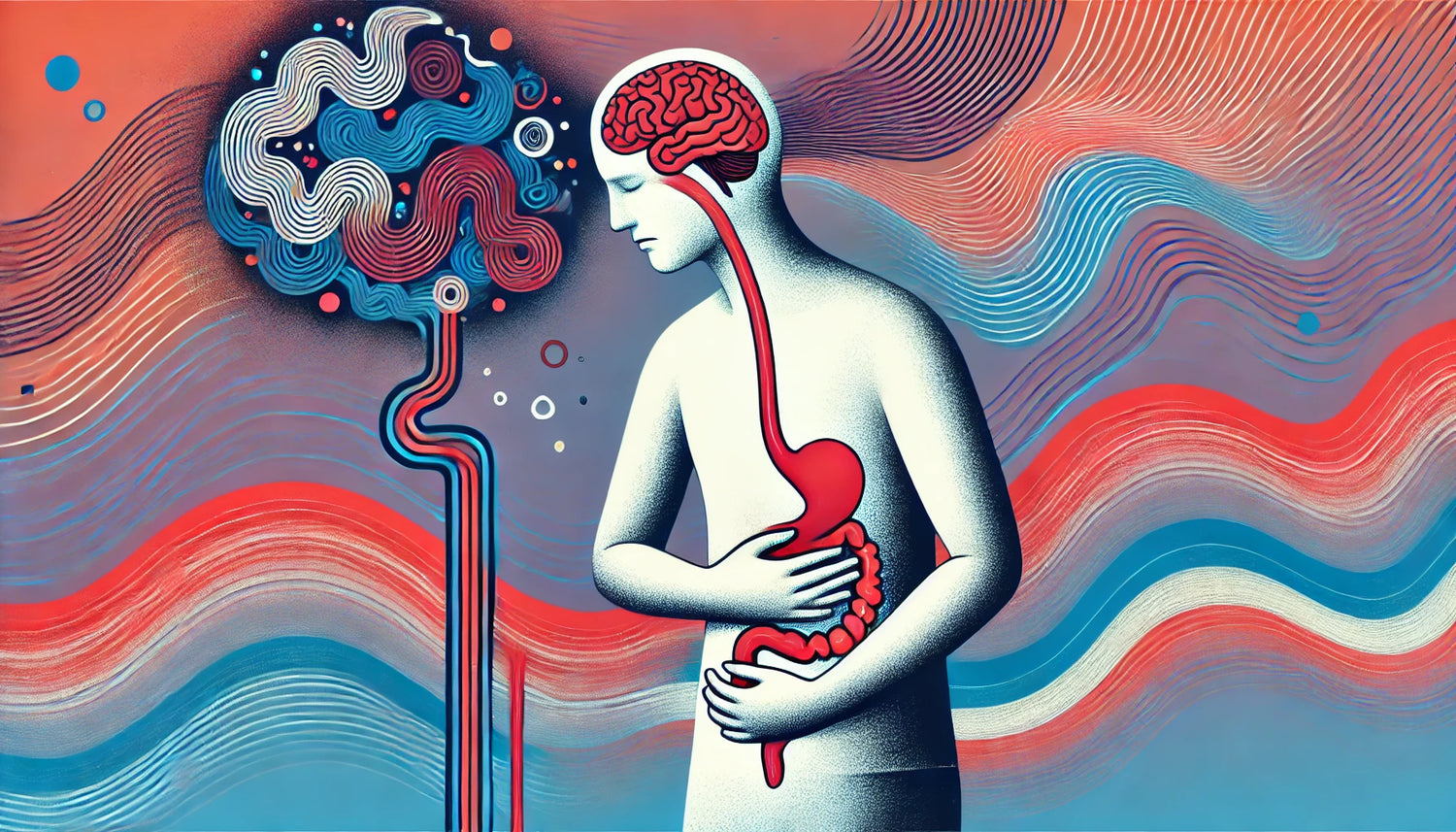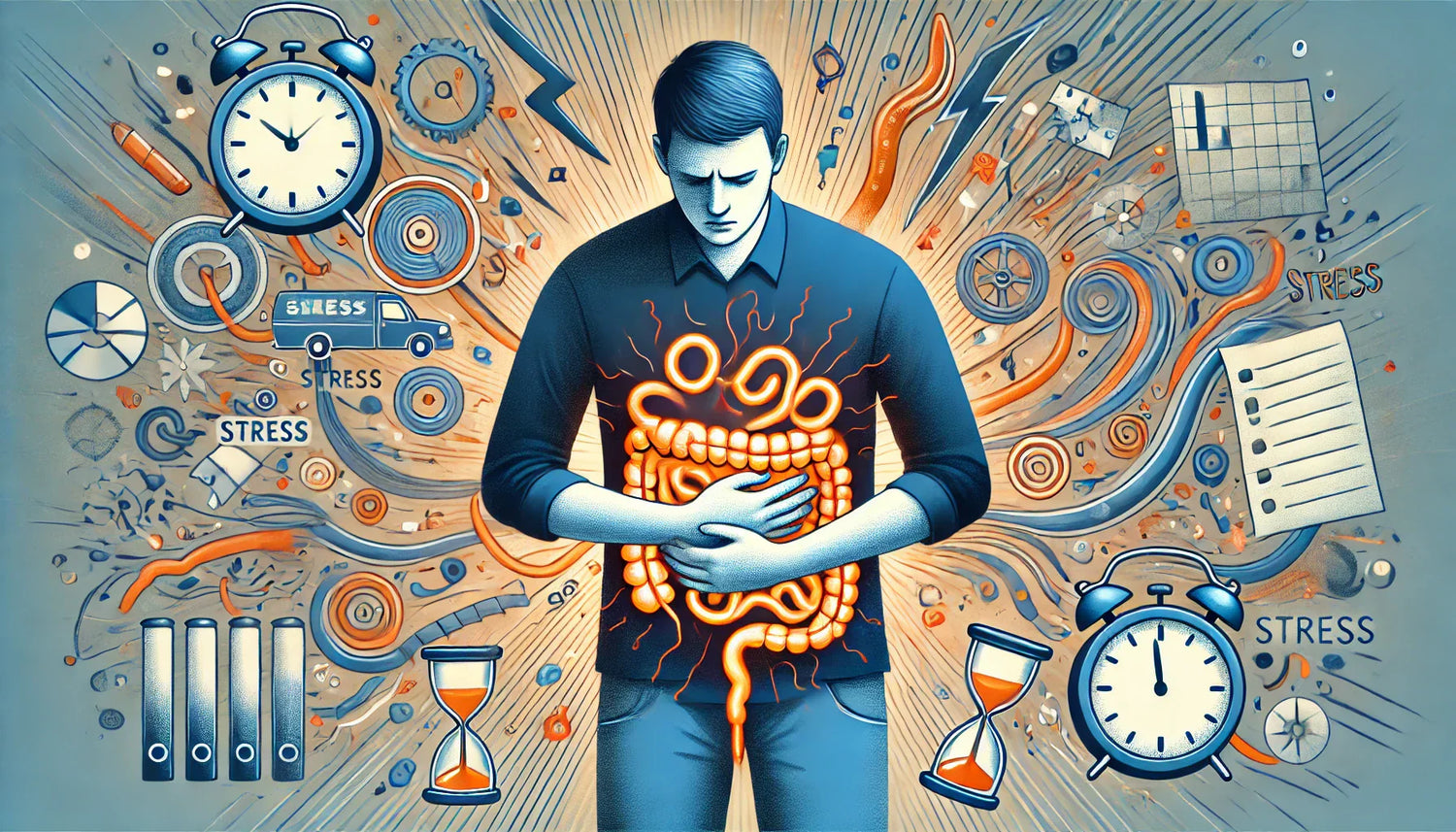Stress is often discussed for its mental and emotional effects, but it also impacts our physical health, especially that of the intestines. Stress-related digestive disorders can become disabling if not treated. This article will help you understand the signs to watch for and when it is necessary to consult a doctor or pharmacist.
- Why does stress impact the intestines?
- What are the symptoms of a stress-related digestive disorder?
- The different types of digestive disorders linked to stress
- How to treat stress-related digestive disorders?
- When to see a doctor for stress-related digestive problems?
Why does stress impact the intestines?
The brain and digestive system are connected by a close link called the "brain-gut axis."
When we are stressed, the brain releases hormones like cortisol that can disrupt digestion. They slow down or speed up intestinal transit.
Additionally, stress reduces the production of good bacteria in the gut, which can worsen digestive issues.
Stress therefore sends signals which directly disrupt the normal functioning of the intestinal flora .

What are the symptoms of a stress-related digestive disorder?
Stress -related digestive disorders can cause a variety of easily recognizable symptoms:
- Abdominal pain or cramps,
- Bloating or feeling of heaviness,
- Diarrhea or constipation,
- Nausea or feeling like vomiting,
- Acid reflux or heartburn,
- Disturbed appetite, which may lead to overeating or loss of appetite.
The different types of digestive disorders linked to stress
Irritable bowel syndrome (IBS)
IBS is often triggered by stress , which affects communication between the brain and gut.
This can cause intestinal muscle spasms. These then lead to pain, bloating, and alternating diarrhea and constipation . Stress amplifies the sensitivity of the intestines, exacerbating symptoms.
It is recommended to see a specialist so that the disease is declared and properly managed.

Stress gastritis
Gastritis occurs when stress increases the production of stomach acid , irritating the stomach lining . Symptoms include heartburn, abdominal pain, and sometimes nausea or vomiting.
Stress-related constipation and diarrhea
Stress can disrupt intestinal motility: it slows down transit (constipation) or accelerates it (diarrhea) . The nervous system, which is closely linked to the digestive tract, overreacts to stressful situations, causing these disorders. Stress management strategies can help reduce these symptoms! Let's find out.
How to treat stress-related digestive disorders?
To treat digestive disorders linked to stress, it is essential to act on several aspects:
Number 1: Adopt good eating habits
Eating too late or too quickly can disrupt digestion, especially when stressed. Adopt the following good practices:
- Eat at set times to help the body regulate itself.
- Eat slowly and chew your food well to aid digestion.
- Avoid spicy foods, alcohol and tobacco . They irritate the digestive mucosa and aggravate gastritis symptoms.
- Eating foods rich in fiber and drinking enough water promotes good intestinal transit. Constipation and diarrhea are therefore less frequent.
- Favor foods rich in magnesium (nuts, seeds, green vegetables) to help manage stress.
- Using dietary supplements such as magnesium, probiotics or relaxing plants ( valerian, passionflower) can help regulate the digestive system and reduce stress-related symptoms.

Soothe your stress-related stomach aches with our anti-stress capsules!
Our formula based on natural ingredients reduces fatigue and soothes tension
Discover the anti-stress capsules!Number 2: Improve sleep
Getting enough sleep in a cool room (below 20°C) helps the body regenerate. This is essential for calming the nervous system and digestive disorders .
Stress disrupts sleep and causes fatigue , and in turn, poor sleep worsens digestive problems.
Number 3: Reduce exposure to screens and waves
High frequency waves (Wi-Fi, Bluetooth, cell phones) as well as time spent in front of screens can overstimulate the brain and increase stress.
This can directly affect digestion by disrupting the body's natural rhythms. By reducing this exposure, you allow your digestive system to function more harmoniously.

Number 4: Regular physical exercise
Regular physical activity, preferably outdoors , is a great way to reduce stress. Exercise stimulates the release of endorphins, the happy hormones, which help improve mood and relax the muscles of the digestive system. Gentle exercises such as yoga or walking also help regulate intestinal transit.
Number 5: Take breaks and practice relaxation techniques
Taking time to relax helps relieve accumulated stress. Mindfulness meditation, yoga or sophrology are effective methods for calming the nervous system , which indirectly improves digestive symptoms such as irritable bowel syndrome. These practices promote deep breathing and help regulate the functioning of the digestive system.
Number 6: Self-massage
Self-massage of the belly helps relieve tension in the abdominal muscles and stimulate blood circulation. This can promote better digestion. This helps relax the muscles of the digestive system, reducing cramping, bloating and other discomforts.
By combining these strategies, you can relieve stress-related digestive issues and improve your overall well-being. However, sometimes professional intervention may be necessary.
When to see a doctor for stress-related digestive problems?

It is important to see a doctor when stress-related bowel problems become chronic or severe .
For example, persistent abdominal pain, bloating, recurring diarrhea or constipation that disrupts daily life requires medical attention.
Other warning signs include unexplained weight loss, difficulty digesting food , or if these symptoms are associated with intense anxiety.
It is also recommended to consult if the symptoms are accompanied by intense fatigue, vomiting or the presence of blood in the stool , which could require further examinations.
Medical monitoring allows you to adjust your diet, use appropriate treatments, or manage stress which strongly influences the functioning of the intestines.
Taking stress-related gut issues seriously is essential to prevent them from becoming chronic or serious. Seeing a doctor early can help you better understand the underlying causes and get the right treatments. By adopting dietary changes, stress management techniques, and medical care, gut health and overall well-being can be significantly improved.







